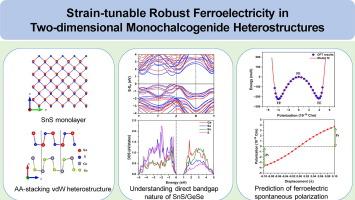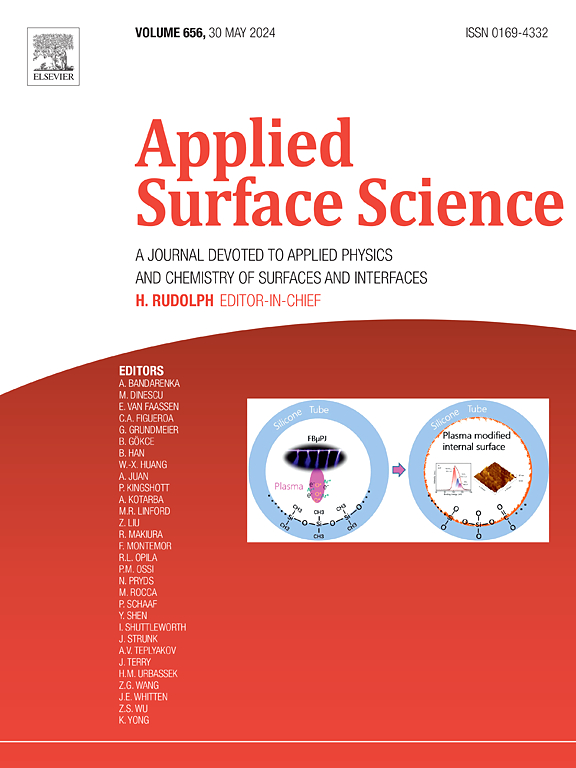二维单卤化物异质结构中的应变可调稳健铁电性
IF 6.3
2区 材料科学
Q2 CHEMISTRY, PHYSICAL
引用次数: 0
摘要
低维层状铁电范德华异质结构(vdWHs)在新型纳米级电子应用(包括非易失性存储器、晶体管和传感器)方面具有极大的吸引力。在这里,我们设计了 SnS/GeSe 多层 vdWHs,并证明该结构具有铁电性,自发极化为 3.71 × 10-10 Cm-1。我们利用范德华(vdW)相关的密度泛函理论(DFT)对SnS和GeSe单层(MLs)以及SnS/GeSe异质结构进行了计算分析。具体来说,我们确定了结构参数、形成能、极化和声子模式。负形成能与声子光谱的实际频率证实了SnS和GeSe单层(MLs)以及SnS/GeSe异质结构的(相对)稳定性。在 SnS/GeSe 结构中保留了两个单层的电子特性,其直接带隙值为 1.13 eV。声子光谱和单层双阱电位的计算揭示了 Pnm21 铁电-Pnmm 准电的相变。SnS/GeSe 多层显示出最大的自发极化(3.71 × 10-10 Cm-1),而 SnS-MLs 和 GeSe-MLs 的自发极化分别为 2.78 × 10-10 Cm-1 和 3.69 × 10-10 Cm-1。此外,我们还证明了 SnS/GeSe 异质结构的自发极化、带隙、动态稳定性和带隙类型可以通过施加双轴应变进行调整。在平面内拉伸应变为 5% 时,SnS/GeSe 的自发极化为 3.90 × 10-10 Cm-1。随着拉伸双轴应变的增加,SnS/GeSe 异质结构的带隙也随之扩大,在拉伸应变达到 2% 时仍能保持其直接带隙半导体的特性。这些研究结果表明,SnS/GeSe 异质结构是一种前景广阔的材料,在纳米电子学中具有巨大的应用潜力。本文章由计算机程序翻译,如有差异,请以英文原文为准。

Strain-tunable robust ferroelectricity in two-dimensional monochalcogenide heterostructures
Low-dimensional layered ferroelectric van der Waals heterostructures (vdWHs) are of tremendous interest for novel nanoscale electronic applications, including nonvolatile memories, transistors, and sensors. Here, we design SnS/GeSe multilayer vdWHs and show that the construct is ferroelectric with a spontaneous polarization of 3.71 × 10-10 Cm−1. We computationally analyze SnS and GeSe monolayers (MLs) and SnS/GeSe heterostructures using density functional theory (DFT) with van der Waals (vdW) correlations. Specifically, we determine structural parameters, formation energies, polarization, and phonon modes. Negative formation energies with real frequencies of phonon spectra confirm the (relative) stabilities of SnS and GeSe monolayers (MLs) and SnS/GeSe heterostructures. The electronic properties of both monolayers are retained in the SnS/GeSe construct, which exhibits a direct band gap with a value of 1.13 eV. The calculations of phonon spectra and double-well potential of monolayers unveil a Pnm21 ferroelectric – Pnmm paraelectric phase transformation. The SnS/GeSe multilayer shows the largest spontaneous polarization of 3.71 × 10-10 Cm−1 compared to 2.78 × 10-10 Cm−1 and 3.69 × 10-10 Cm−1 for SnS- and GeSe-MLs, respectively. Additionally, we demonstrate that the spontaneous polarization, band gap, dynamic stability, and band gap types of SnS/GeSe heterostructures can be tuned through the application of biaxial strains. For an in-plane 5 % tensile strain, SnS/GeSe has a spontaneous polarization of 3.90 × 10-10 Cm−1. The band gap of the SnS/GeSe heterostructure widens with increasing tensile biaxial strain, maintaining its characteristics as a direct band gap semiconductor up to 2 % tensile strain. These findings demonstrate that SnS/GeSe heterostructures are promising materials with significant potential for applications in nanoelectronics.
求助全文
通过发布文献求助,成功后即可免费获取论文全文。
去求助
来源期刊

Applied Surface Science
工程技术-材料科学:膜
CiteScore
12.50
自引率
7.50%
发文量
3393
审稿时长
67 days
期刊介绍:
Applied Surface Science covers topics contributing to a better understanding of surfaces, interfaces, nanostructures and their applications. The journal is concerned with scientific research on the atomic and molecular level of material properties determined with specific surface analytical techniques and/or computational methods, as well as the processing of such structures.
 求助内容:
求助内容: 应助结果提醒方式:
应助结果提醒方式:


